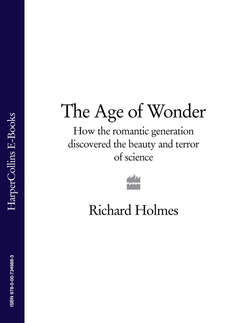Читать книгу The Age of Wonder: How the Romantic Generation Discovered the Beauty and Terror of Science - Richard Holmes - Страница 9
3
ОглавлениеThe Age of Wonder aims to raise and reflect upon such questions. Yet in the end the book remains a narrative, a piece of biographical storytelling. It tries to capture something of the inner life of science, its impact on the heart as well as on the mind. In the broadest sense it aims to present scientific passion, so much of which is summed up in that childlike, but infinitely complex word, wonder. Plato argued that the notion of ‘wonder’ was central to all philosophical thought: ‘In Wonder all Philosophy began: in Wonder it ends…But the first Wonder is the Offspring of Ignorance; the last is the Parent of Adoration.’4
Wonder, in other words, goes through various stages, evolving both with age and with knowledge, but retaining an irreducible fire and spontaneity. This seems to be the implication of Wordsworth’s famous lyric of 1802, which was inspired not by Newton’s prism, but by Nature’s:
My heart leaps up when I behold
A rainbow in the sky;
So was it when my life began;
So is it now I am a man;
So be it when I shall grow old,
Or let me die!…5
This book is centred on two scientific lives, those of the astronomer William Herschel and the chemist Humphry Davy. Their discoveries dominate the period, yet they offer two almost diametrically opposed versions of the Romantic ‘scientist’, a term not coined until 1833, after they were both dead. It also gives an account of their assistants and protégés, who eventually became much more than that, and handed on the flame to the very different world of professional Victorian science. But it draws in many other lives, and it is interrupted by many episodes of scientific endeavour and high adventure so characteristic of the Romantic spirit: ballooning, exploring, soul-hunting. These were all part of the great journey.♣
It is also held together by, as a kind of chorus figure or guide, a scientific Virgil. It is no coincidence that he began his career a young and naïve scientific traveller, an adventurer and secret journal-keeper. However, he ended it as the longest-serving, most experienced and most domineering President of the Royal Society: the botanist, diplomat and éminence grise Sir Joseph Banks. As a young man Banks sailed with Captain Cook round the world, setting out in 1768 on that perilous three-year voyage into the unknown. This voyage may count as one of the earliest distinctive exploits of Romantic science, not least because it involved a long stay in a beautiful but ambiguous version of Paradise-Otaheite, or the South Pacific island of Tahiti.
♣ The fine survey by Lisa Jardine, Ingenious Pursuits: Building the Scientific Revolution (1999), gives a vivid picture of the leading figures in the seventeenth-century scientific revolution across Europe, and includes a significant introductory essay on the emerging role of science in modern society. See also my bibliography, ‘The Bigger Picture’, page 485.
♣ The apple fell in his orchard at Woolthorpe, Lincolnshire, where Newton, aged twenty-five, had retired from Cambridge during the Plague of 1665. Various versions of the story began to appear after his death in 1727. It appears in Stukeley’s unpublished Memoir of Newton, originally written in 1727, but not given to the Royal Society in manuscript until 1752; in unpublished notes for a biography by his nephew John Conduit; and for the first time in print in Voltaire’s Letters on the English Nation (1734). Part of the power of the story was that it replaced the sacred Biblical account of the Fall from Innocence in Genesis (Eve and the apple) with a secular parable of the Ascent to Knowledge. See Patricia Fara, Newton: The Making of Genius (2005); and for a broad visionary perspective, Jacob Bronowski’s scientific classic The Ascent of Man (1973).
♣ A brief guide to the many figures who jostle into this book, some familiar but others obscure or unexpected, appears in my Cast List, page 471.
